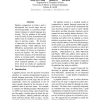Free Online Productivity Tools
i2Speak
i2Symbol
i2OCR
iTex2Img
iWeb2Print
iWeb2Shot
i2Type
iPdf2Split
iPdf2Merge
i2Bopomofo
i2Arabic
i2Style
i2Image
i2PDF
iLatex2Rtf
Sci2ools
ACL
2006
2006
A Pipeline Framework for Dependency Parsing
Pipeline computation, in which a task is decomposed into several stages that are solved sequentially, is a common computational strategy in natural language processing. The key problem of this model is that it results in error accumulation and suffers from its inability to correct mistakes in previous stages. We develop a framework for decisions made via in pipeline models, which addresses these difficulties, and presents and evaluates it in the context of bottom up dependency parsing for English. We show improvements in the accuracy of the inferred trees relative to existing models. Interestingly, the proposed algorithm shines especially when evaluated globally, at a sentence level, where our results are significantly better than those of existing approaches.
ACL 2006 | ACL 2007 | Common Computational Strategy | Natural Language Processing | Pipeline Computation |
Related Content
| Added | 30 Oct 2010 |
| Updated | 30 Oct 2010 |
| Type | Conference |
| Year | 2006 |
| Where | ACL |
| Authors | Ming-Wei Chang, Quang Do, Dan Roth |
Comments (0)

